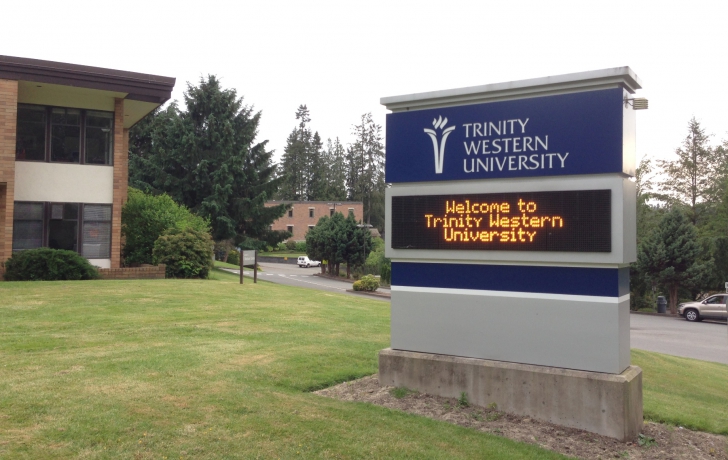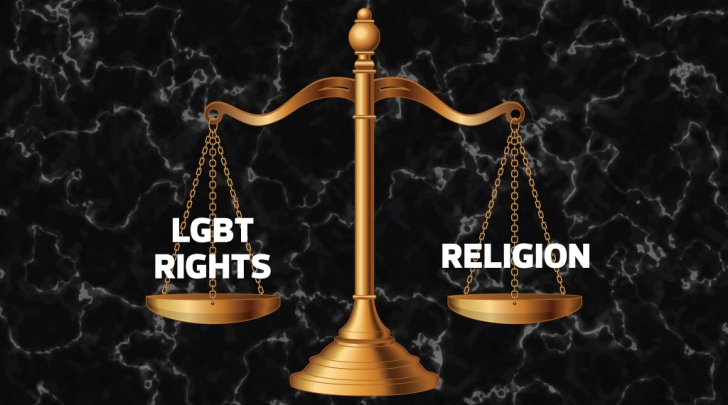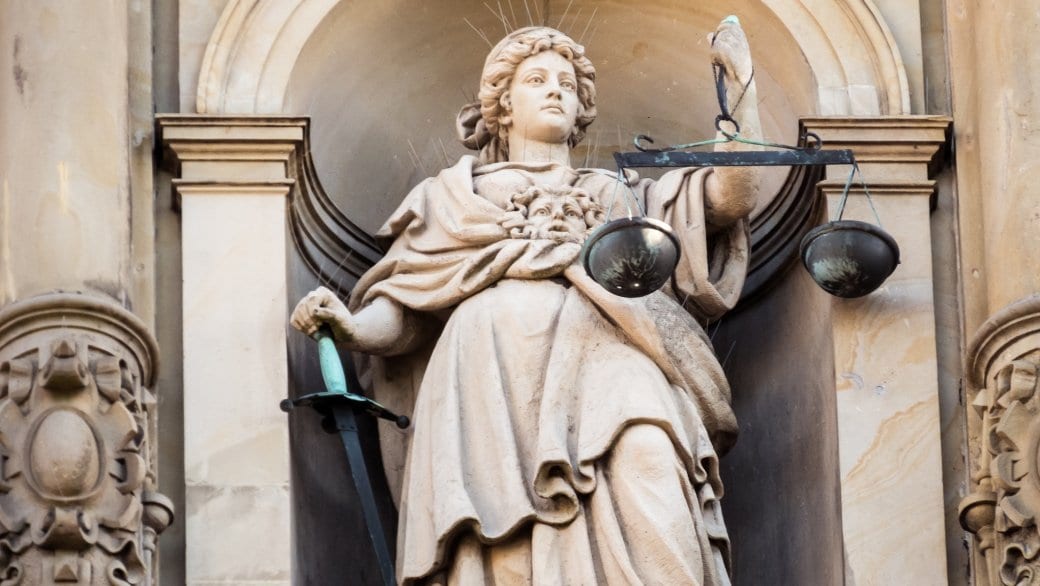As religious rights continue to clash with LGBT rights across North America, one constitutional law professor at the University of Alberta has issued a plea for peaceful co-existence.
Eric Adams has watched “harsh rhetoric and anxious handwringing” dog debates over gay-straight alliances in Alberta’s schools, including its Catholic ones. Though many on both sides of the divide would likely disagree, Adams insists that LGBT rights and religious beliefs can be reconciled.
He says it’s a fundamental error to think one side has to prevail over the other.
Catholic schools don’t have to be abolished to protect LGBT students, he says.
“Be a Catholic school,” he says. “Have a cross on the wall. Teach religion from a Catholic point of view. That to me is possible in a world in which students are able to identify and live out their own genders, as I think our human rights law requires.”
Adams says students can handle complex messages. “They live in a plural world,” he says. “We’re doing them a service in educating them about the ways in which there may be differences of opinion at the level of religious belief.”
Adams believes Catholic schools have the right to teach the beliefs of their church. At the same time, he says, governments have a duty to ensure Catholic schools meet minimum requirements for the education and well being of their students.
He points to last year’s Supreme Court of Canada decision that upheld the Quebec government’s right to tell a Catholic school to teach about other world religions too. “Knowing about those people and those religions and that diversity is part of what it means to be a healthy and full citizen in Canadian society,” he says. “Those kinds of teachings don’t infringe on anybody’s religious freedoms.”
Teaching students about diversity “doesn’t make them any less Catholic, or the Catholic school any less a Catholic environment,” he insists. “The assumption is if we do, we cease to be a Catholic school. I say why?”
He draws an important distinction, though, between teaching religious beliefs — and withholding equal access to teaching based on those beliefs.

(Trinity Western University is locked in legal battle with several law societies who object to the Christian school’s covenant and have refused to accredit any graduates from its proposed law school./Ross Johnson/Daily Xtra)
“The example of Trinity Western is to me like the bake shop that doesn’t want to bake for gay weddings,” Adams says, referring to the Christian university in Langley, BC that forbids sex outside heterosexual marriage in the campus community.
They’re allowed not to like same-sex marriage, he says, “but if you are providing a service to the public, the human rights to equality are going to demand that you provide those services on a non-discriminatory basis.
“The state’s not telling you that you can’t have those views — and some of those views might be religiously motivated about what you think marriage should be or shouldn’t be,” he says.
“But if you are in the business of providing public goods, as a society we have to be able to say equality triumphs in that circumstance.”
Co-existence or capitulation?
Like Adams, panelists at a February 2016 talk on religious freedom and LGBT rights, hosted by the American Bar Association’s Civil Rights and Social Justice Section, broadly concluded that there is room for the two to co-exist.
For Mark Schickman, the section’s immediate past chair, this kind of clash and the issues it throws up are not new.
In the beginning, elbows are bumping as the limits to people’s rights are being sorted out, he says.
And while the US Supreme Court has weighed in on such clashes in the past, and may even do so again, he says, the current battles over both bathroom bills and religious freedom bills are only the latest in a series of civil rights struggles over the past 50 years in the US that were initially incendiary but ended with some form of accommodation.

(The current battles over bathroom and religious freedom bills really boil down, as always, to who counts as a person in the US, Mark Schickman says./Francesca Roh/Daily Xtra)
“You see lots of footage from the 1950s and 1960s where segregationists claimed they were protecting the natural order of things and that really the morality was on their side because they were looking at social and natural order. Looking back on this 50 years later, you can see how ludicrous the argument sounds,” Schickman says.
“I think the same thing is going to happen [with this issue],” he says, “if you were able to have a time machine and look at this 50 years from now.”
Asked about the comparability between past struggles and the current context of religious conservatives versus transgender people, for example, Schickman says there is actually a lot of similarity in the struggle to define identity and personhood.
“The reason I say this is no different is because for 2,000 years, we were killing each other over the issue of which God we believed in, and in that historical context, it translated not into what you believed in but what you were,” he says.
“This notion of what is inherent in personhood moves with the issue,” Schickman says.
“There are some people who come from a religious rights perspective who do recognize that part of personhood is having a choice of who you are going to be, and I believe there’s a small percentage of people who go out and take the position that their religion requires this challenge,” he says.
“But I think these issues are of equal importance to proponents — whether the proponents are gay, or people of colour, or persons with disabilities, or gender identity in terms of the equal rights struggle between male and female — all are set up as the definition of who and what a person is.”
These issues will work themselves out, he insists, especially with a little help from the equality provisions in the US Constitution.
For Schickman, there will inevitably be more challenges, but he also believes the tipping point has passed.
Same-sex marriage is now legal in the US, he points out. “Once you’ve got a situation where you’ve got so many people married under marriage equality laws, this does not become an isolated item affecting people on the fringe,” he says. “We’re beyond that at this point, and so there is no field of endeavour where one can be shocked by what you see.”
As for trans rights, Schickman says some people may initially have a hard time accepting it, but once some laws protecting trans people have been in place for five years, he predicts the landscape will begin to change.
“Twenty years ago, 10 years ago, if you were sitting on a street corner and see a same-sex couple holding hands or hugging, it was shocking, and you would stop what you were doing and look,” Schickman says. “Today it mightn’t get a second glance. That’s largely the experience here, and one of the challenges of our republic is that we’ve got some more conservative, some more liberal pockets, but the Constitution is a great document that works itself out.”


 Why you can trust Xtra
Why you can trust Xtra


